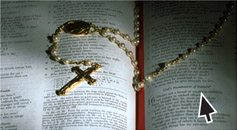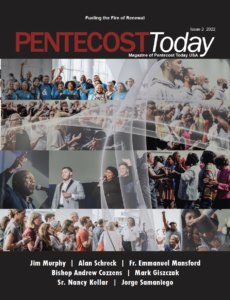Third Sunday of Easter
Meditation and Questions for Reflection or Group Discussion
Mass Readings:
1st Reading: Acts 3:13-15, 17-19
2nd Reading: 1 John 2:1-5
Responsorial: Psalm 4:2, 4, 7-9
Gospel: Luke 24:35-48
Opening Our Minds and Hearts to God’s Glorious Plan
The author of life you put to death, but God raised him from the dead. (Acts 3:15)
Let’s set the stage for today’s first reading. Peter has just healed a man who had been lame from birth. Thrilled at his healing, the man begins jumping for joy in the Temple, which attracts a large crowd. Everyone is astonished. Everyone, that is, but Peter. “Why are you amazed at this?” he asks (Acts 3:12). Surely he was happy, but he seems more surprised at their astonishment than at the miracle itself!
So why would Peter be so unsurprised? Perhaps the answer comes in his words to the crowd. At least three times, Peter announces something more astonishing than this miracle: after all that we did to Jesus, God raised him from the dead and gave him back to us as our Savior. “The author of life you put to death,” he says, “but God raised him” (Acts 3:15). It was a stunning reversal that no one saw coming. God repaid our cruelty with his divine love.
Through the drama of Good Friday, Easter Sunday, and Pentecost, Peter learned how merciful and generous God is. Remember, Peter had denied Jesus and fled at his arrest. He, the “Rock” of the Church, crumbled in fear. And still, Jesus forgave him and welcomed him back. So, after all this, nothing could astonish Peter any more. He knew that God wanted only good for his people.
This is the astonishingly good news of the gospel: God is relentless in his mercy. He takes our worst sins to himself, wipes them away, and gives us healing and forgiveness instead of punishment and retribution.
At Mass today, remember that no matter how bad your sins are, no matter what you think you deserve, God has just one answer for you. In yet another stunning reversal, he offers you his Son, Jesus, in the humble form of bread and wine.
“Thank you, Father, for repaying my sins with your love! Lord, I want to follow your way of mercy.”
Download this reflection with discussion questions here.
(Many thanks to The Word Among Us (www.wau.org) for allowing us to use meditations from their monthly devotional magazine. Used with permission.)
Sunday, April 15, 2018
Questions for Reflection or Group Discussion:
- The first reading begins with these words: “Peter said to the people: ‘The God of Abraham, the God of Isaac, and the God of Jacob, the God of our fathers, has glorified his servant Jesus, whom you handed over and denied in Pilate’s presence when he had decided to release him. You denied the Holy and Righteous One and asked that a murderer be released to you. The author of life you put to death, but God raised him from the dead; of this we are witnesses.’” Peter goes on to tell the people that they “acted out of ignorance” when they handed Jesus over to Pontius Pilate to be put to death. He then tells them to “Repent, therefore, and be converted, that your sins may be wiped away.”
- In what ways has this Lenten and Easter season opened your eyes more deeply to the truth of Jesus’ love for you, the work of his cross and resurrection, and the forgiveness of your sins?
- What do these last words from the reading mean to you: “Repent, therefore, and be converted, that your sins may be wiped away”? How has this affected your own ongoing conversion and your relationship with him?
- The responsorial psalm begins with these words, “When I call, answer me, O my just God, you who relieve me when I am in distress; have pity on me, and hear my prayer! Know that the LORD does wonders for his faithful one; the LORD will hear me when I call upon him.” It ends with these words: “O LORD, let the light of your countenance shine upon us! You put gladness into my heart. As soon as I lie down, I fall peacefully asleep, for you alone, O Lord, bring security to my dwelling.”
- How would you describe the reasons for the psalmist’ confidence in the Lord’s faithfulness and care for him?
- In what ways do these Scriptures relate to your experience? How can you make them a greater reality in your life?
- The second reading opens with these words: “My children, I am writing this to you so that you may not commit sin. But if anyone does sin, we have an Advocate with the Father, Jesus Christ the righteous one. He is expiation for our sins, and not for our sins only but for those of the whole world.”
- In what ways do these words continue the theme of the first reading, that is, turning to Christ and relying on him to overcome sin?
- What examples do you have of Christ freeing you from sin during these holy seasons of Lent and Easter? If you can’t think of any examples, what obstacles may be getting in the way?
- The Gospel reading begins with these words: “The two disciples recounted what had taken place on the way and how Jesus was made known to them in the breaking of bread,” that is, the Eucharistic meal.
- Do you believe that Jesus wants to make himself known to you in a deeper way during Mass, as you listen to him in the Scriptures and receive him in the Eucharist? What are some ways you have experienced this?
- What steps you can take before and during Mass to open yourself even more to the Lord’s presence?
- The Gospel ends with these words: “He said to them, ‘These are my words that I spoke to you while I was still with you, that everything written about me in the law of Moses and in the prophets and psalms must be fulfilled.’ Then he opened their minds to understand the Scriptures.” These words are a reminder that there are hundreds of prophecies about the Messiah in the Old Testament that were fulfilled by Jesus, including where he was born, his many titles, his mission, and many details about his passion, death, and resurrection.
- Why do you think it was important for Jesus to fulfill “everything written” about him “in the law of Moses and in the prophets and psalms”?
- How important are these fulfilled prophecies to you?
- The meditation is a reflection on the first reading and these words of Peter from the reading: “The author of life you put to death, but God raised him from the dead” (Acts 3:15). It includes these words: “Through the drama of Good Friday, Easter Sunday, and Pentecost, Peter learned how merciful and generous God is. Remember, Peter had denied Jesus and fled at his arrest. He, the ‘Rock’ of the Church, crumbled in fear. And still, Jesus forgave him and welcomed him back.
- How would you describe the reasons for Peter’s amazing turnaround and recovery from his betrayal of Jesus?
- In what ways do the reasons mentioned in the meditation apply to your own walk with the Lord?
- Take some time now to pray and thank the Lord for revealing to you his great love and mercy. Ask him for the grace to follow his glorious plan for your life. Use the prayer below from the end of the meditation as the starting point.
“Thank you, Father, for repaying my sins with your love! Lord, I want to follow your way of mercy.”
[The discussion questions were created by Maurice Blumberg, who is currently a member of the board of directors of the ChristLife Catholic Ministry for Evangelization (www.christlife.org/) and a member of the National Service Committee Council of the Catholic Charismatic Renewal (www.nsc-chariscenter.org). Maurice was also the founding executive director of the National Fellowship of Catholic Men, a former chairman of the board of The Word Among Us (www.wau.org), and director of partner relations for The Among Us Partners ministry. He can be contacted at (Enable Javascript to see the email address) mblumberg@wau.org or mblumberg@aol.com.]


 Click Here for us to pray for your intentions through our new website.
Click Here for us to pray for your intentions through our new website. 
